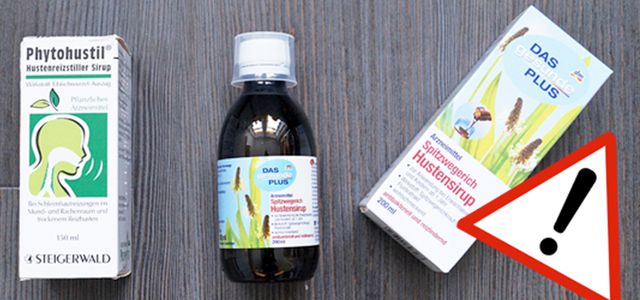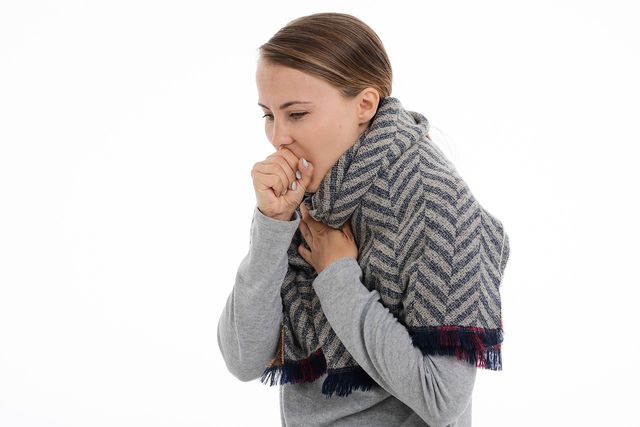
Over-the-counter cough medication is booming during the cold season. That is why Öko-Test has had its effects and ingredients examined in the laboratory. The result is surprising: very few cough suppressants really help.
Cough suppressants promise to loosen the phlegm in the throat or relieve the urge to cough. Cough is not a disease, but just one of many symptoms of a cold. In order to get rid of a cough, no medication is usually necessary, writes the German Society for General and Family Medicine.
Anyone who takes cough suppressants can at most relieve the symptoms, but not cure the disease. But for many of the drugs examined, not even the soothing effect has been scientifically proven, criticized Öko-Test 2018. The magazine had 24 common, non-prescription cough suppressants and expectorants tested – most failed.
Öko-Test: Which cough suppressants really help?

For the first cough phase with dry, irritating cough, cough suppressants are offered as cough syrup or syrup. According to the Öko-Test, however, these should only be taken in exceptional cases, for example to be able to sleep at night. The active ingredient dextromethorphan is most likely to relieve the urge to cough.
Cough medicine: test winner at Öko-Test
Cough suppressant: only 1x “very good”
At Öko-Test ist, only one product was able to prevail among the cough suppressants, all other cough suppressants in the test were only “sufficient” or worse. The winner:
-
Wick cough syrup with dextromethorphan received the grade “very good”. According to the Öko-Test, the effectiveness has been proven; it is suitable for ages 14 and up, but contains 5% alcohol. Buy **: Wick cough syrup is available in public pharmacies or online, among other things Shop pharmacy, DocMorris or To the rose pharmacy.
Expectorant: 3 herbal cough suppressants help
As the disease progresses, mucus settles in the throat. Doctors recommend coughing up the mucus naturally. Herbal medicines can make coughing easier and at least subjectively provide relief. In 2018, Öko-Test gave three times the top rating of “very good” for herbal expectorants. The winners:
- Bronchipret TP: The effectiveness of the combination of thyme and primrose root has been proven and the medicinal product does not contain any questionable ingredients (suitable for ages 12 and up). Buy **: in public pharmacies or online at Shop pharmacy, DocMorris or To the rose pharmacy.
- Gelomyrtol Forte: It contains extracts of eucalyptus oil, sweet orange oil and lemon oil, the effects of which have been scientifically proven (suitable for ages 6 and up). Buy **: in any pharmacy or online at Shop pharmacy, Doc Morris or To the rose pharmacy
- Soledum capsules Forte: The contained cineole comes from the eucalyptus plant and has been shown to relieve coughs (suitable for ages 12 and up). Buy **: in any pharmacy or online at Shop pharmacy, Doc Morris or To the rose pharmacy.
“Good” cut the cough suppressant Umckaloabo away. The extract from the roots of the South American plant Pelargonium sidoides was found to alleviate symptoms in acute bronchitis. You can find it at DocMorris or Shop pharmacy. All other expectorants were “satisfactory” or worse.
Also read: Home remedies for cough – the best tips
Stiftung Warentest: What really helps against coughs?
Stiftung Warentest also regularly evaluates cough suppressants and has described the correct way to deal with cold coughs. These are the best tips from the product testers:
- Cough drops relieve the urge to cough, because they ensure greater saliva production.
- There is none medical evidence that the increased intake of hot drinks helps against coughs – even if hot tea or a hot lemon are perceived as beneficial. When coughing, nobody should force themselves to drink more than they want.
- the Indoor air shouldn’t be too dry. To moisten the air, you can hang wet towels over the heater or set up water bowls. Indoor plants also help.
- Warm steam promotes blood flow to the mucous membranes and moisturizes the airways. According to Stiftung Warentest, there is also here none Medical proof that inhaling steam helps against a cold – of course it can still be perceived as beneficial. The same goes for a cold bath.
- honey can relieve the urge to cough.
- Those who sneeze in the crook of their arm reduce it Risk of contagion for other people. On the other hand, if you sneeze into your hands, viruses can spread to others more easily from there.
- smoking is of course taboo when coughing.
Cough suppressant: Stiftung Warentest 2019 recommends this product

The Stiftung Warentest also looked at cough suppressants. And here, too, the experts explain that cold cough is usually not has to be treated with medication because it goes away on its own. However, home remedies for coughs or dry coughs can support the recovery process.
What non-prescription cough suppressants concerns, the product testers also recommend the active ingredient dextromethorphan, which is also in the Öko-Test winner Wick cough syrup is included (buy ** with Shop pharmacy, DocMorris, To the rose pharmacy).
Other drugs with dextromethorphan are the cough suppressant from Ratiopharm as well as Silomat lozenges and Silomat intensive capsules. According to the product test, they are also suitable for short-term treatment of dry, irritating coughs at night. The active ingredients dropropizine and pentoxyverine, on the other hand, are less well documented in terms of their effectiveness.
Stiftung Warentest does not recommend any expectorants
If the cold has already passed from the dry to the “slimy” phase, the product testers give it no clear recommendations more. All over-the-counter products on the market are only suitable to a limited extent, according to Stiftung Warentest, as the study situation has not yet been sufficient to prove an effect. No explicit recommendation is given for cough and bronchial teas either. Stiftung Warentest even considers agents with bromhexine or the active ingredient guaifenesine to be “unsuitable”.
For Gelomyrtol, Bronchipret and Soledum – The herbal expectorants, which received a “very good” rating from Öko-Test – the product testers only had the verdict: “Suitable with some restrictions as a secretion-dissolving agent for coughs”.
You can find all information from Stiftung Warentest on the subject of coughs here.
Öko-Test: These cough suppressants failed in 2018
Most of the active ingredients and cough suppressants that Öko-Test examined in 2018 were not convincing. Either there was no evidence of effectiveness, or the products contained problematic ingredients – or both.
- For Ribwort plantain Öko-Test found no proof of effectiveness. It is found, for example, in Klosterfrau Broncholind cough syrup and the cough syrups from Rossmann (Altapharma) and dm (Das Gesunde Plus).
- Also for Ivy leaves as an expectorant, the effectiveness is only partially proven. You can find them in Prospan cough syrup and Sinuc Akut, among others.
- the ACC acute Effervescent tablets received a “poor”. According to the Öko-Test, there is no proof of effectiveness for the acetylcysteine it contains.
-
Mucosolvan cough syrup got away with “sufficient”. The testers complained that the active ingredient used, Ambroxol, did not clearly help; There was also a deduction for the preservative benzoic acid.
To the test: The full Öko-Test cough suppressant can be found in Öko-Test 01/2018.
Authors: SC Schulz, L. Wirag
Read more at Utopia:
- 6 herbal remedies for a cold
- Preventing a cold: this is how you stay healthy
- Make cough syrup yourself from onions and honey